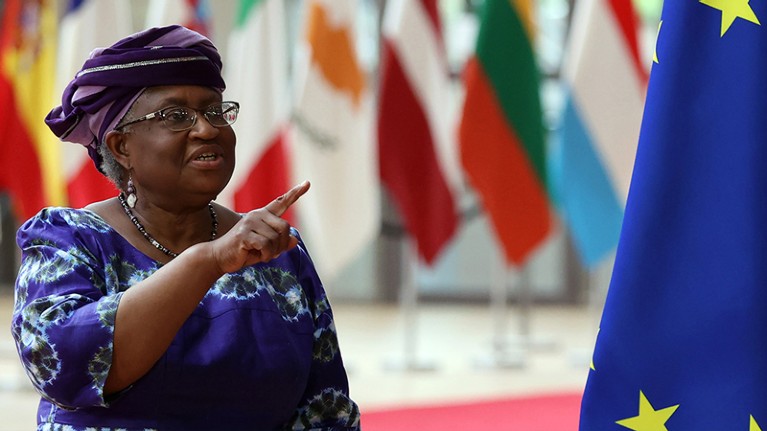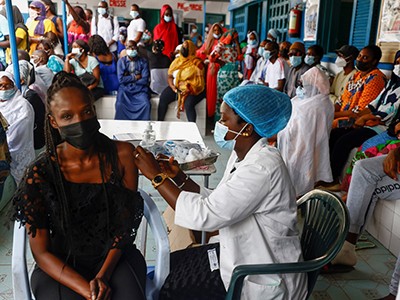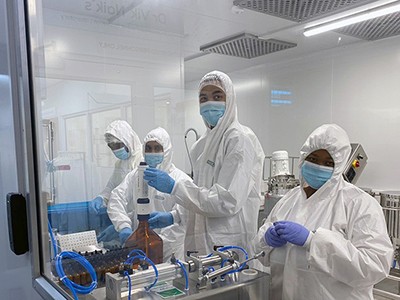
World Trade Organization director-general Ngozi Okonjo-Iweala has said her team members are ready to roll up their sleeves to reach an agreement on waiving intellectual property for COVID-19 vaccines.Credit: Dursun Aydemir/Anadolu/Bloomberg/Getty
Should more countries be making their own coronavirus vaccines, drugs and testing kits? Yes, without a shadow of doubt, says an international campaign led by India and South Africa, and backed by researchers, non-governmental organizations (NGOs) and publications including Nature. The campaign is calling for temporary relief on COVID-19-related intellectual property (IP), including patents, for at least the duration of the pandemic.
More companies in more countries must be able to make vaccines without the threat of being sued by high-powered legal teams representing the pharmaceutical firms that dominate vaccine supply. By giving more companies the legal ability to reproduce COVID-19 vaccines and drugs, a waiver could help to increase supplies and pave the way for a more equitable distribution of life-saving technologies.
China and the United States, along with more than 100 other countries, are sympathetic to this idea. Until now, most European nations have been opposed. However, European Union member states finally seem to be warming to the principle that IP needs to be shared in a pandemic, and have agreed to accelerate the existing process for IP relief. This is not the breakthrough that is needed, because it does not give low-income countries the ability to produce and distribute vaccines freely, quickly and without completing time-consuming paperwork so that lives can be saved now. But it does represent a change in the EU’s position.
Global vaccination must be swifter
The need to share COVID-19-related IP remains urgent. Two years into the pandemic, fewer than 15% of people in low-income countries have had at least one dose of a vaccine, whereas in some high-income countries, people are being offered fourth doses. This has happened, in part, because the governments of wealthy nations can offer vaccine makers large sums that poor countries cannot match. A number of companies are, in turn, making large profits, so have little incentive to change their business model. Last month, Pfizer, which, along with its partner BioNTech, has manufactured and distributed more than 3 billion mRNA vaccines, reported a net profit of almost US$22 billion for 2021 — more than double the amount for 2020. According to data from the Center for Global Development, a think tank in Washington DC, richer nations have vaccinated people against COVID-19 at a rate faster than for any previous disease.
The EU has previously said that existing international rules allow countries to override IP in an emergency such as a pandemic, so there should be no need for extra relief. But these rules, known as compulsory licensing, are not fit for a pandemic. During the past two years, no company has been granted a compulsory licence to make a COVID-19 vaccine.
Representatives of the EU, India, South Africa and the United States have been meeting at the World Trade Organization (WTO) in Geneva, Switzerland, to try to resolve the impasse. Earlier this month, they announced that the compulsory-licensing process can be accelerated. Under existing compulsory-licensing rules, a separate application has to be made for a waiver for each patent involved — and a single technology can involve dozens of patented processes. The group proposes that companies in low- and middle-income countries be allowed to make just one application per vaccine.
South African scientists copy Moderna’s COVID vaccine
In February, Afrigen Biologics and Vaccines in Cape Town, South Africa, demonstrated that it has the technical ability to reproduce Moderna’s mRNA vaccine. If the proposal agreed at the WTO is endorsed by all members, Afrigen could, in theory, make one application to the South African government for permission to make and sell the vaccines at scale.
But researchers and IP experts say that the latest proposal still has a number of problems. First, pharmaceutical companies can seek to block compulsory-licence applications, which Pfizer is already doing. Second, the proposal does not include access to forms of data that might be needed to make vaccines, but that are not covered in a patent. It also requires companies looking to reproduce a vaccine to draw up a list of all patents that must be waived — something that would take too long to be practical in a pandemic. Moreover, the EU does not have the backing of the United Kingdom and Switzerland, where several of the world’s biggest pharmaceutical companies are based.
Identifying all of the IP that goes into specific technologies cannot be done quickly. A preliminary analysis by the World Intellectual Property Organization shows that applications were made for 417 COVID-19 vaccine-related patents between the start of 2020 and the end of September 2021. The analysis is preliminary because it takes an average of 18 months between an application being filed with a patent office and the application being published. There are many more patents still to come.
A faster solution would be to allow vaccines to be reproduced, legally, without the need to wait for a complete list of patents as a condition to getting started. Such a document could still be drawn up, but it should not be used to hold up vaccine development and manufacturing.
Agreements necessarily need compromise, especially when they involve finding a consensus between the WTO’s 164 member countries and maintaining the support of more than 100 NGOs. But there’s no benefit to a massive negotiation if the result is no extra COVID-19 drugs or vaccines. That’s why one compromise might be to focus on vaccine IP alone, rather than on all COVID-19 interventions. This could provide the best chance of saving lives, protecting economies, stopping the rise of new variants and, ultimately, curbing this devastating pandemic.

 Global vaccination must be swifter
Global vaccination must be swifter
 South African scientists copy Moderna’s COVID vaccine
South African scientists copy Moderna’s COVID vaccine
 A patent waiver on COVID vaccines is right and fair
A patent waiver on COVID vaccines is right and fair
 How COVID spurred Africa to plot a vaccines revolution
How COVID spurred Africa to plot a vaccines revolution
 What it will take to vaccinate the world against COVID-19
What it will take to vaccinate the world against COVID-19





